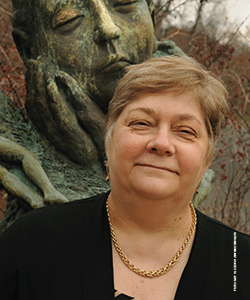Elissa L. Newport

© Lloyd Wolf / www.lloydwolf.com
Georgetown University
William James Fellow Award
With a background in cognitive science and now a professor of neurology, Newport has devoted her career to studying human language acquisition and developmental psycholinguistics, with a focus on the relationship between language development and language structure. She studies both normal language acquisition and creolization using miniature languages presented to learners in the lab, where both the input and the structure of the language can be controlled.
A second line of research for Newport concerns maturational effects on language learning. In her less-is-more hypothesis, she posits that children are, paradoxically, better able than adults to learn languages because they have fewer cognitive resources available to them. In contrast, adults try to analyze language using more complex computational abilities and do not as readily find the broad regularities. This provides an explanation for why people who learn a language later in life are generally not as successful as children who learn language early.
Newport also conducts studies of human learners acquiring musical and other nonlinguistic patterns to see similarities and differences in sequential learning across domains.
Her most recent work employs functional MRI to examine how signed and spoken languages are represented in the brain and how language is reorganized after damage or disease. As director of the Center for Brain Plasticity and Recovery, she and her colleagues are using stroke as a model in which to study neuroplasticity and recovery in children and adults. Their aim is to use a deeper understanding of recovery of function in children to enhance recovery in adults.
Newport’s work on developmental plasticity — how learning mechanisms change over age — has not only fostered our understanding of language development, but is also exploring new ways to help adults recover from brain injuries.





APS regularly opens certain online articles for discussion on our website. Effective February 2021, you must be a logged-in APS member to post comments. By posting a comment, you agree to our Community Guidelines and the display of your profile information, including your name and affiliation. Any opinions, findings, conclusions, or recommendations present in article comments are those of the writers and do not necessarily reflect the views of APS or the article’s author. For more information, please see our Community Guidelines.
Please login with your APS account to comment.